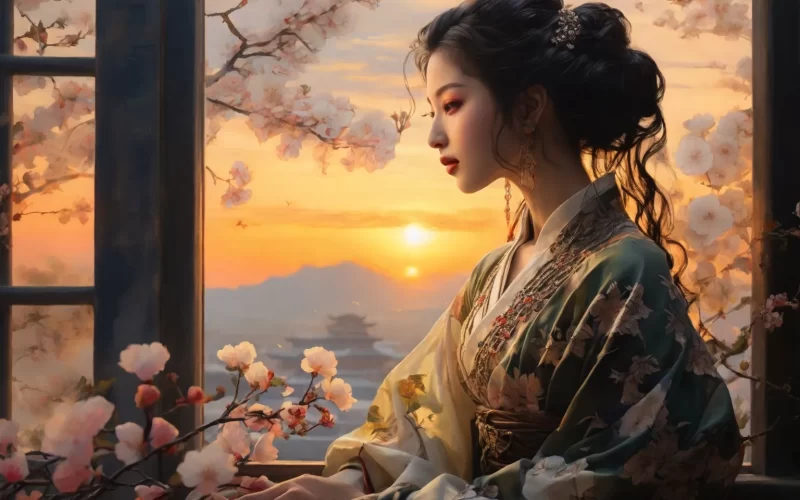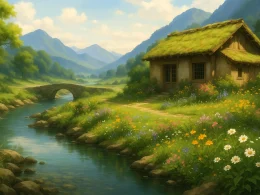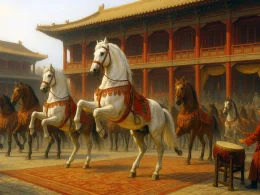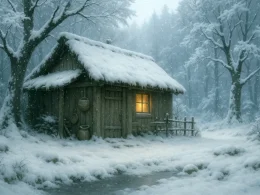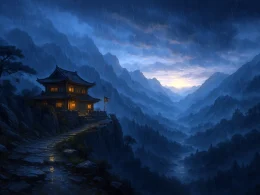When the moon has coloured half the house,
With the North Star at its height and the South Star setting,
I can feel the first motions of the warm air of spring
In the singing of an insect at my green-silk window.
Original Poem
「月夜」
刘方平
更深月色半人家,北斗阑干南斗斜。
今夜偏知春气暖,虫声新透绿窗沙。
Interpretation
This Tang Dynasty poem by Liu Fangping captures spring's arrival through the lens of nighttime serenity. Rather than depicting spring's exuberance directly, the poet employs delicate imagery—deep night, insect songs, and gauze curtains—to convey the season's quiet, tender transformation, showcasing his refined and distinctive sensibility.
First Couplet: "更深月色半人家,北斗阑干南斗斜。"
Gēng shēn yuèsè bàn rénjiā, Běidǒu lángān Nándǒu xié.
Late at night, moonlight bathes half the homestead; The Dipper tilts, the Southern Stars crest.
This couplet paints the night sky from a gazing perspective, weaving together "late night," "half-lit homes," and "slanting stars" into a tranquil celestial tableau. The poet first grounds the scene in human space—moonlight spilling into courtyards—then lifts the gaze to the vast cosmos, evoking a hushed, timeless atmosphere.
Second Couplet: "今夜偏知春气暖,虫声新透绿窗纱。"
Jīnyè piān zhī chūn qì nuǎn, chóng shēng xīn tòu lǜ chuāngshā.
Tonight, suddenly, spring’s warmth is known— As insect songs pierce green window-gauze, newly flown.
Here, spring announces itself through sound: the first fragile chirps penetrating the "green window-gauze." The adverb 偏 ("unexpectedly") hints at the poet’s quiet wonder, while 新透 ("newly pierces") masterfully shifts the sensory focus from sight to hearing, animating the stillness with life’s subtle resurgence.
Holistic Appreciation
The poem begins with gazing at the night sky before shifting to the sound of insects by the window, capturing spring’s arrival not through conventional vibrant daytime imagery but through the subtle whisper of "insect-song piercing gauze." Here, spring is not a riot of colors but a delicate, nocturnal awakening. Spatially, the scene unfolds from "half-lit households" to "window screens," moving from broad to intimate; temporally, it deepens from "late night" into the heart of midnight’s chorus. Blending visual tranquility with auditory vitality, the poem merges stillness and life in a lingering, contemplative harmony.
Artistic Merits
Set against the backdrop of night, the poem employs meticulous detail and empathetic projection onto nature. The first couplet paints celestial light and shadows to evoke serenity, while the latter couplet’s "insect-song piercing gauze" conveys spring’s first stirrings. Its inventive conception and refined imagery reveal grandeur in minutiae. The "green window screen" and "newly penetrating insect-song" form the poetic core, with the word "new" sharpening the sensation of keen, joyful awareness, amplifying the verse’s warmth and depth.
Insights
This poem reminds us: spring’s arrival need not be a fanfare; it can slip in silently, pulsing through nature in the quietest moments—like insectsong through gauze. Life’s beauty often dwells in such unnoticed details. With acute senses and tender brushstrokes, the poet unveils nature’s quiet grace and spring’s latent promise, inviting us to discover warmth and hope in stillness.
Poem translator
Kiang Kanghu
About the Poet
Liu Fang-ping (刘方平) was a native of Luoyang. Liu Fangping was a native of Luoyang. He was good at painting landscapes and writing poems, but he was unrecognized throughout his life, and lived in seclusion on the banks of the Yingshui and Ruhe rivers, and remained unrepresented throughout his life.







